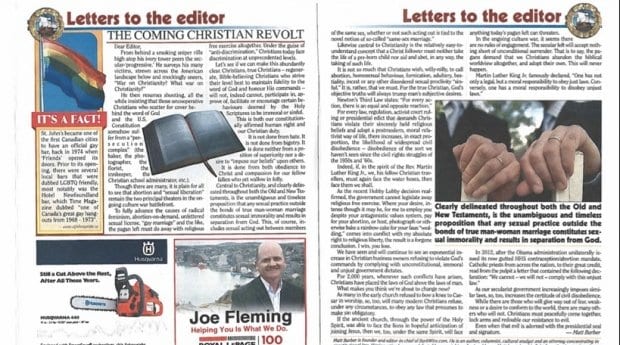Two LGBT activists in Newfoundland are withdrawing a complaint against a local magazine after the editor apologized for publishing a homophobic letter.
On Aug 8, Pam Pardy-Ghent, the managing editor of The Newfoundland Herald, a weekly news magazine, went on NTV, a local station with the same parent company as The Herald, to apologize to the LGBT community for a letter published in the Aug 3 to 9 issue of the magazine.
“That’s what we’re really hearing from people is that they feel that they have already had enough struggles,” Pardy-Ghent told NTV. “And for a local publication like ours to contribute to that is hurtful, and we have heard that message loud and clear.”
In the letter, Matt Barber, who, according to his Twitter profile, is an American Christian blogger and lawyer, writes at length against abortion and the legalization of gay marriage. “It is not so much that Christians wish, willy-nilly, to call abortion, homosexual behavior, fornication, adultery, bestiality, incest or any other disordered sexual proclivity ‘sinful,’” Barber writes. “It is, rather, that we must. For the true Christian, God’s objective truths will always trump man’s subjective desires.”
After reading the letter, Kyle Curlew and Chelsea Noel filed a complaint under the hate speech provisions of the Canadian Criminal Code. Curlew and Noel both sit on the board of Memorial University’s Grenfell Campus Student Union and are members of Western Pride NL. They say they were concerned that the letter would act as a rallying call for Christians to stand up against “evil homosexuals.”
“These sort of people and their sort of antiquated ideology doesn’t have a place in society, especially in Canadian politics,” Noel says.
On Newfoundland’s east coast, St John’s Pride issued a letter stating that while its members stand in solidarity with Western Pride NL, they would not pursue legal action, preferring instead to work with The Herald to start work on a “LGBTQ style guide for journalists.” Representatives from St John’s Pride have not yet responded to Xtra’s requests for an interview.
Cara Zwibel, the director of the fundamental freedoms program at the Canadian Civil Liberties Association, says that Canadian courts generally reserve hate speech decisions for more extreme statements than the views published in The Herald.
“My view is that some of the things that have been looked at by human rights tribunals and courts and held not to be considered hate speech are much worse than what this article says,” Zwibel says.
In R v Keegstra, one of the leading Canadian cases on hate speech laws, the CCLA argued as an intervenor that the hate speech provision in the Criminal Code actually violates the Charter right to freedom of expression because the section is capable of proscribing a “wide range of expression.”
Though Zwibel was not sure if the CCLA would take the same position again if it intervened in a similar case, she did point out that the Criminal Code has other sections that make it illegal to willfully promote violence or genocide. “Those things are more specific and I think easier to identify than what constitutes promotion of hatred,” she says.
Zwibel expresses concern about the potential impact on free speech of seeking to hold a newspaper criminally responsible for the views that it publishes. “I would be concerned about the chilling impact that these kinds of complaints brought against media outlets might have on their willingness to publish a variety of views,” she says. “Particularly when we are talking about a letter-to-the-editor section where it is very clear this is not the editorial board of the newspaper.”
Noel maintains the letter’s antagonistic tone against the LGBT community made it unlawful. “It’s not free speech if it impinges upon someone else’s right to exist,” Noel says.
However, a court will not be needed to decide whether Barber’s letter constitutes hate speech. After Pardy-Ghent apologized on NTV, Curlew and Noel decided to drop their complaint and focus instead on working with Western Pride NL and The Newfoundland Herald to present more positive representations of LGBT people in media.
Pardy-Ghent tells Xtra that she has committed to personally respond to each inquiry about Barber’s letter. She also reportedly told other media outlets that she plans to print many of the reactions to the piece.
That, to Zwibel, is the essence of free expression. “The opportunity to show that this is not a view that is widely shared; it’s a view that is widely panned and disagreed with and angers people and upsets them. I think it’s a positive thing to have that dialogue going on,” she says.


 Why you can trust Xtra
Why you can trust Xtra


